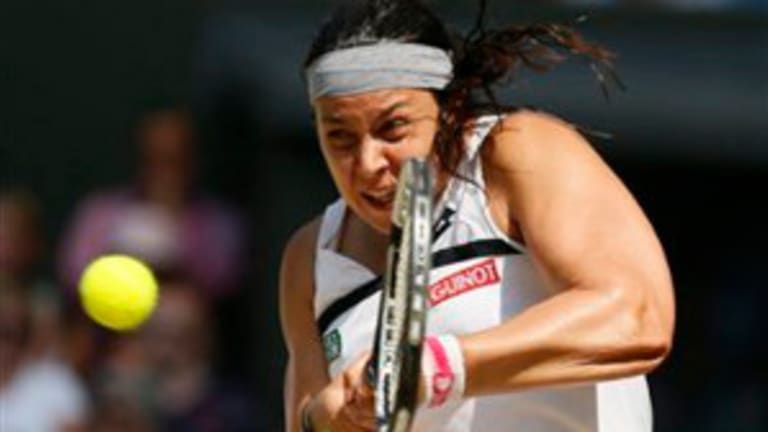Although any year is a good one to win Wimbledon, 2013 wasn’t the greatest of years to be crowned champion of the “Ladies’ Singles.” Somehow, it only figures that outlier Marion Bartoli would have her career achievement immediately buried in the avalanche of public interest and media coverage of Andy Murray’s success.
But really, has anyone since Jana Novotna seemed simultaneously so credible yet so surprising a champion? Bartoli arguably became the most unlikely Wimbledon champion since Novotna, who won in 1998, while Scotland’s Murray became the first British man to win Wimbledon since Fred Perry 77 years ago. Bartoli was as swiftly forgotten as Viriginia Wade, the last Brit to win a Wimbledon singles title, during the tournament’s centenary celebration in 1977.
I say “arguably” because you could also make a case for Petra Kvitova as the ultimate surprise champ. And before either of these two contenders call it a career, it may appear that way. But I still give the nod to Bartoli, because Kvitova’s game seemed tailor-made for success at Wimbledon, and when she won it at the tender age of 21 it seemed that tennis had minted a new player destined for greatness. It didn’t quite work out that way, but we didn’t know that then.
By the beginning of 2012, Kvitova found herself a few swings of the racquet from the No. 1 ranking; by contrast, Bartoli is 27 years old and had never come anywhere near the top spot. Sure, she had been in a Wimbledon final before, but she had never come close to duplicating that run of 2007. As the years went by, that streak seemed a pure fluke. The only other time Bartoli reached the quarterfinal round was 2011, when she was beaten convincingly there by. . . Sabine Lisicki. The German girl was the overnight heroine of the London crowd this year until Bartoli made her pay for the honor by whipping her, but good, in the title match.
But there’s another, perhaps deeper and less supportable reason for why Bartoli’s triumph is so surprising, as well as so meaningful. I hinted at it when I used the word “outlier” above to describe her. Bartoli is an acquired taste that few ever really acquire. Her win at Wimbledon repeats a statement made fairly often in tennis—that an aspiring player doesn’t have to conform, kow-tow, or study the owner’s manual when it comes to developing a game good enough to win the most prestigious tournament in the world.
Bartoli has always colored outside the lines. She’s different, from her shape to her double-handed game, from her claims to intellectual superiority to those bizarre between-point rituals meant to keep her focused, from her favorite pastime (painting) to her apparent lack of social grace—who but Bartoli could actually keep a straight face as she declared, “It (winning Wimbledon) will not change me as a person because I will always remain the same: Very humble, very low-key and easygoing, down-to-earth.”
Isn’t it someone else who’s supposed to describe you that way, Marion? Never mind.
